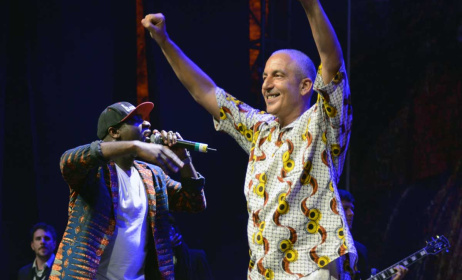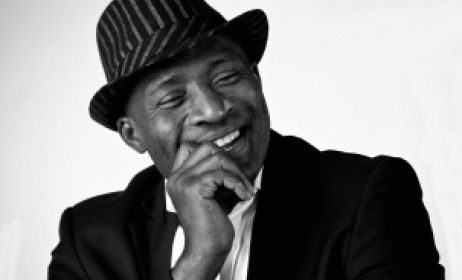Tanzania's Jagwa Music throws out the rule book
Shake your body but watch your heart, for this is Afro-punk on steroids, a full-on sensory assault.
When the youthful eight-piece band took to the stage at Sauti za Busara music festival last month, Jagwa Music’s maddening pace, looping lo-fi sounds, loud irreverent percussion and sweaty, racy moves cast a spell on the audience.
 Members of Jagwa Music band. Photo:http: rwmf.net
Members of Jagwa Music band. Photo:http: rwmf.net
This was our induction into mchiriku, a street style characterised by distortion of electronic sounds, which originated 20 years ago in the poor suburbs of Dar es Salaam thanks to cheap Casio keyboards hooked up to vintage amplifiers and megaphones.
It was like nothing I’d ever seen, like techno in a mad sprint. But the animated lead singer, Jack Aluta Kazimoto, who grew up in Morogoro, Tanzania, said this music was popular in uswahilini and mitaani, which are colloquialisms for “poor neighbourhoods”.
“Since I was 18, I would stand on a stool and perform mnanda in street gigs,” the 26 year old said.
To make mchiriku or mnanda music, Jagwa, like street artists, rig up a riotous orchestra made up of kinanda (keyboard), dumbaki drums, old-school misondo drums, stuli, which is a battered stool beaten with sticks, rika (tambourine), chekeche (shakers), a whistle, bicycle bells and other knock-together instruments.
But instruments do not make mchiriku. An important part of the genre is the themes, the mantras and slogans that relate to the everyday life of unemployment, oppressive relatives, unfaithful partners, AIDS, drugs and alcohol. Jagwa sing in Swahili and compose music rich in counsel. But in keeping with the frenzied restlessness, the lyrics are all over the place, dealing with multiple issues, spitting one-liners on repeat.
Dunia watu, binadamu wachache (The world is full of people, but there are few human ones)/Tanzania itabaki kuwa Tanzania, Ulaya itabaki kuwa Ulaya (Tanzania will be Tanzania, and the West will be the West)/Heshima haiuzwi (You can’t buy respect).
“I composed ‘Wametoka Mbali’ (They Have Come a Long Way) for a friend of mine who requested that I celebrate their daughters Leila and Asiya who came after eight years of childlessness,” Kazimoto said. In the song, he urges society to leave the couple alone, because despite their long wait, they love each other.
The band was founded in 1992 and although the current members have joined the group within the past 10 years, the chief composer, Abdallah Gora, and the band's patron, George Abdul Jolijo, have been at it from the beginning.
Performing regularly at family celebrations in Dar es Salaam and its surroundings, the band has a busy schedule. Internationally, Jagwa has performed at WOMEX, WOMAD, Roskilde Festival and more recently across the US in a tour produced by Center Stage. They have staged shows at Sauti za Busara in Zanzibar every year since 2014.
The group has two albums, Tumechoka Hoi and Bongo Hotheads, but nothing can ever prepare you for the din, energy and precariousness of their live performances. Fearlessly displaying the power of youth, disruption and improvisation, Jagwa is a revolution in East African music.



























Commentaires
s'identifier or register to post comments